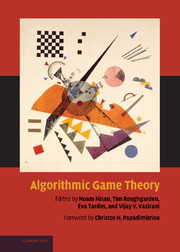Book contents
- Frontmatter
- Contents
- Foreword
- Preface
- Contributors
- I Computing in Games
- 1 Basic Solution Concepts and Computational Issues
- 2 The Complexity of Finding Nash Equilibria
- 3 Equilibrium Computation for Two-Player Games in Strategic and Extensive Form
- 4 Learning, Regret Minimization, and Equilibria
- 5 Combinatorial Algorithms for Market Equilibria
- 6 Computation of Market Equilibria by Convex Programming
- 7 Graphical Games
- 8 Cryptography and Game Theory
- II Algorithmic Mechanism Design
- III Quantifying the Inefficiency of Equilibria
- IV Additional Topics
- Index
8 - Cryptography and Game Theory
from I - Computing in Games
Published online by Cambridge University Press: 31 January 2011
- Frontmatter
- Contents
- Foreword
- Preface
- Contributors
- I Computing in Games
- 1 Basic Solution Concepts and Computational Issues
- 2 The Complexity of Finding Nash Equilibria
- 3 Equilibrium Computation for Two-Player Games in Strategic and Extensive Form
- 4 Learning, Regret Minimization, and Equilibria
- 5 Combinatorial Algorithms for Market Equilibria
- 6 Computation of Market Equilibria by Convex Programming
- 7 Graphical Games
- 8 Cryptography and Game Theory
- II Algorithmic Mechanism Design
- III Quantifying the Inefficiency of Equilibria
- IV Additional Topics
- Index
Summary
Abstract
The Cryptographic and Game Theory worlds seem to have an intersection in that they both deal with an interaction between mutually distrustful parties which has some end result. In the cryptographic setting the multiparty interaction takes the shape of a set of parties communicating for the purpose of evaluating a function on their inputs, where each party receives at the end some output of the computation. In the game theoretic setting, parties interact in a game that guarantees some payoff for the participants according to the joint actions of all the parties, while the parties wish to maximize their own payoff. In the past few years the relationship between these two areas has been investigated with the hope of having cross fertilization and synergy. In this chapter we describe the two areas, the similarities and differences, and some of the new results stemming from their interaction.
The first and second section will describe the cryptographic and the game theory settings (respectively). In the third section we contrast the two settings, and in the last sections we detail some of the existing results.
Cryptographic Notions and Settings
Cryptography is a vast subject requiring its own book. Therefore, in the following we will give only a high-level overview of the problem of Multi-Party Computation (MPC), ignoring most of the lower-level details and concentrating only on aspects relevant to Game Theory.
- Type
- Chapter
- Information
- Algorithmic Game Theory , pp. 181 - 206Publisher: Cambridge University PressPrint publication year: 2007
- 35
- Cited by



